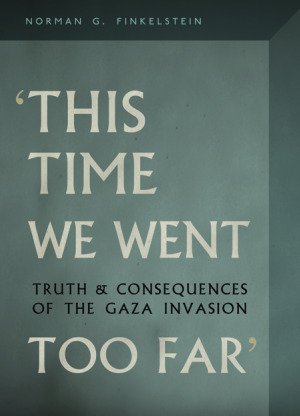A Comment on Norman Finkelstein’s ‘This Time We Went Too Far’: Truth & Consequences of the Gaza Invasion (OR Books, 2010)
We are approaching the second anniversary of Israel’s Operation Cast Lead in December 2008 into January 2009. Earlier this year, Norman Finkelstein published another one of his critical studies that undermines the moralizing mythology accompanying Israel’s recent outburst of brutality and criminality.
After Israel’s failure in its devastating summer 2006 attack on Lebanon, Finkelstein contends that Israel needed to reestablish its deterrence reputation. How to do this? “Israel could not restore its deterrence by inflicting a military defeat because Hamas was manifestly not a military power….The army was looking for the opportunity to hold a spectacular maneuver in order to show its muscle.” [48-49]
What resulted when Israel showed its muscle?
“Israel destroyed or damaged 58,000 homes (6,300 were completely destroyed or sustained severe damage), 280 school and kindergartens (18 schools were completely destroyed and six university buildings were razed to the ground), 1,500 factories and workshops, several buildings housing Palestinian and foreign media (two journalists were killed while working, four others were also killed), water and sewage installations, 80 percent of agricultural crops, and nearly one-fifth of cultivated land.” [60] From this three-week rampage, 100,000 Palestinians became homeless. Over 1,400 were dead.
Finkelstein goes on to point out, “Israel was able to pinpoint its targets on the ground and, by its own admission, could and did hit these designated targets with pinpoint accuracy. It thus cannot be said that the criminal wreckage resulted from mishap or from a break in the chain of command. What happened in Gaza was meant to happen—by everyone from the soldiers in the field who executed the orders to the officers who gave the orders to the politicians who approved the orders. ‘The wholesale destruction was to a large extent deliberate,’ Amnesty [International] similarly concluded, “and an integral part of a strategy at different levels of the command chain, from high-ranking officials to soldiers in the field.” [65]
War is peace, Orwell wrote.
And Israel’s terrorism is legitimate self-defense, at least in the “civilized” West.
